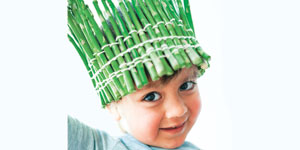Toddler
4 min Read
Nutrients that boost your child’s brain development

September 1, 2015
Toddler
4 min Read

September 1, 2015

 What is your toddler’s favourite food? Probably not beans or spinach. Yet, each day their little bodies grow, and their brains figure out how to create words, solve puzzles and mobilize their bodies to into more precarious locations. Encouraging our kids to eat healthy is important to that growth and development. Knowing where to start helps, so here are four nutrients your toddler needs.
What is your toddler’s favourite food? Probably not beans or spinach. Yet, each day their little bodies grow, and their brains figure out how to create words, solve puzzles and mobilize their bodies to into more precarious locations. Encouraging our kids to eat healthy is important to that growth and development. Knowing where to start helps, so here are four nutrients your toddler needs.
If a toddler’s body doesn’t have enough iron, it can affect the way the brain develops and functions. To be more specific, iron is needed for the creation of the myelin sheath that surrounds nerves. The myelin sheath sort of insulates nerves so they can conduct messages faster and more efficiently from your toddler’s head to their little pudgy toes. Scientists have found toddlers who lack sufficient iron in their diet have lower attention, memory and cognitive skills. In one Greek study, researchers found supplementing iron deficient three- and four-year-olds improved their attention and cognition.
Where to find it: Snack foods like dried apricots, beans, seeds, almonds and edamame beans and in toddler-approved dinner foods, including tofu cubes, roasted chicken legs and cooked spinach (try hiding spinach in pasta sauce or under the cheese on pizza).
Salmon is called ‘pink chicken’ in our family as that was the only way our parents could get their pickiest grandchild to eat it. Salmon is a great source of protein to help a toddler’s muscles recover after all of their attempts to climb, run and jump higher and faster. Most importantly, salmon is packed with docosahexaenoic acid (DHA), an omega-3 fatty acid. Fish oil is vital to the development of a toddler’s brain and eyes. Children have extremely low intakes of DHA (19mg/day), far lower than the recommended minimum intake of 90mg of DHA by the Institute of Medicine of the National Academies. Of note, many omega-3 experts recommend guidelines be closer to 350 mg per day for children.
Where to find it: In salmon, tuna, mackerel, anchovies and sardines.
This nutrient also helps toddlers’ nerve development. Vitamin A is needed by the nervous system to grow and create its intricate pattern of nerves that send messages from your toddlers’ little fingers to his brain.
Where to find it: In green and orange vegetables, including carrots, kale, sweet potatoes and red-leafed lettuce.
In order to grow, the body creates new cells and it needs zinc to do that. Zinc deficiency limits a child’s growth and reduces their ability to fight off infections. In addition, zinc affects how a toddler’s brain works. A study in the Journal of Nutrition, showed that children who are deficient in zinc have lower cognitive (thinking) and motor (moving) function.
Where to find it: Pumpkin seeds, lentils, shellfish and nuts (only if there is no allergy concern). Another great source of zinc is wheat germ – you can sprinkle it into oatmeal, hide in a smoothie or use in recipes instead of breadcrumbs.